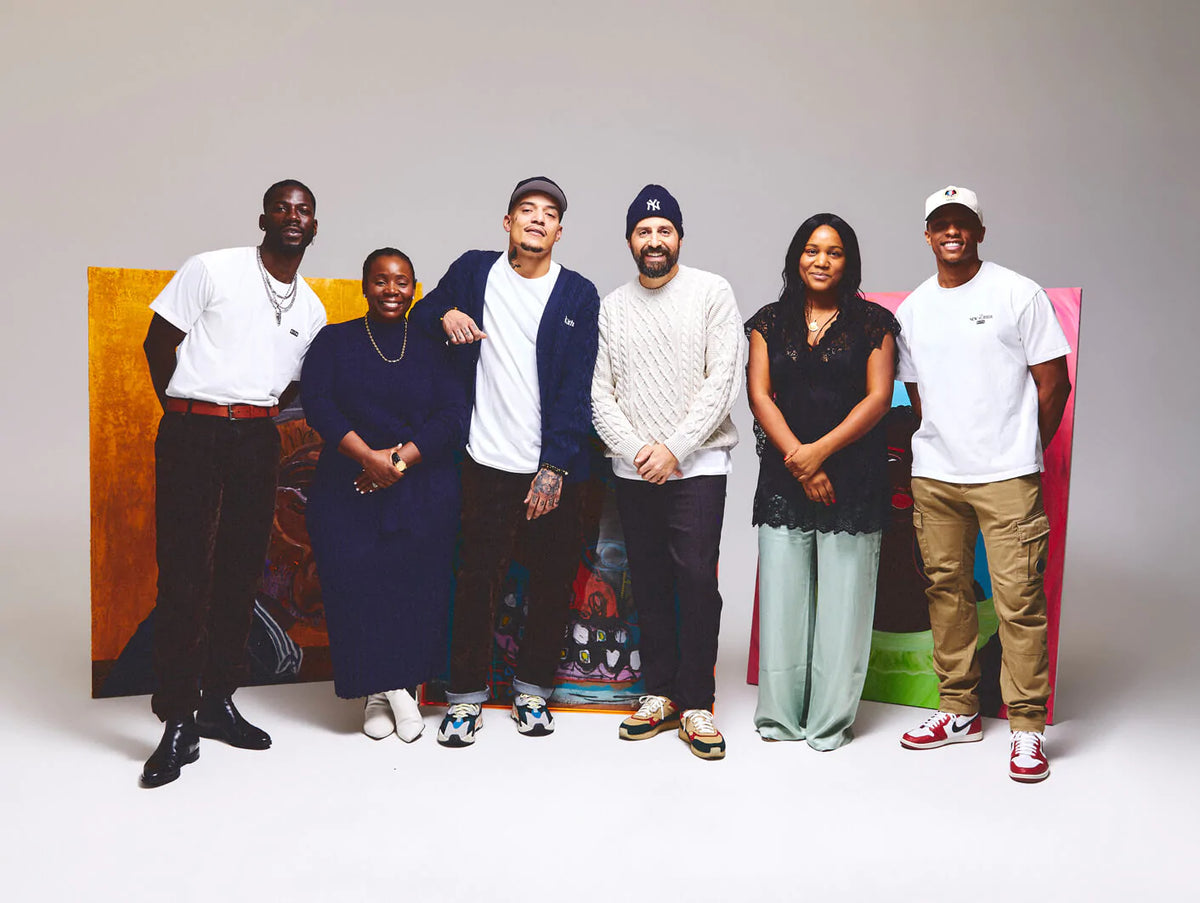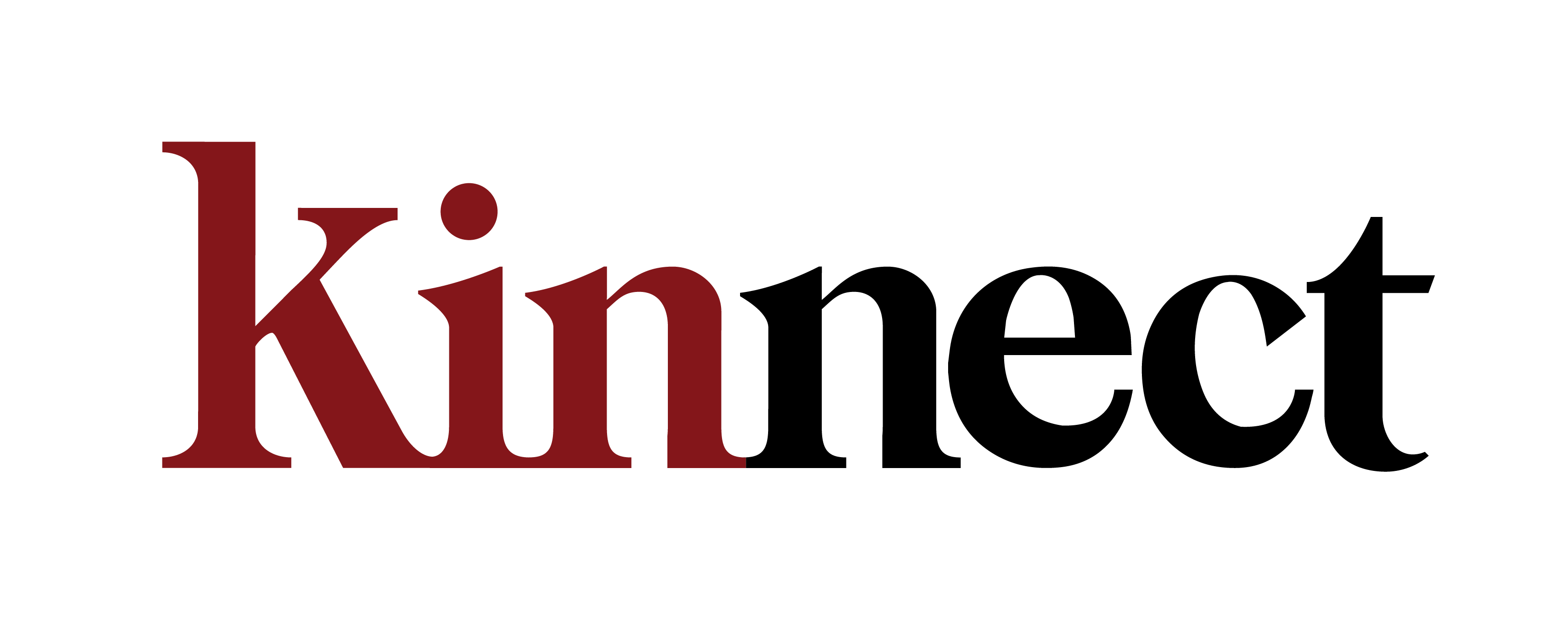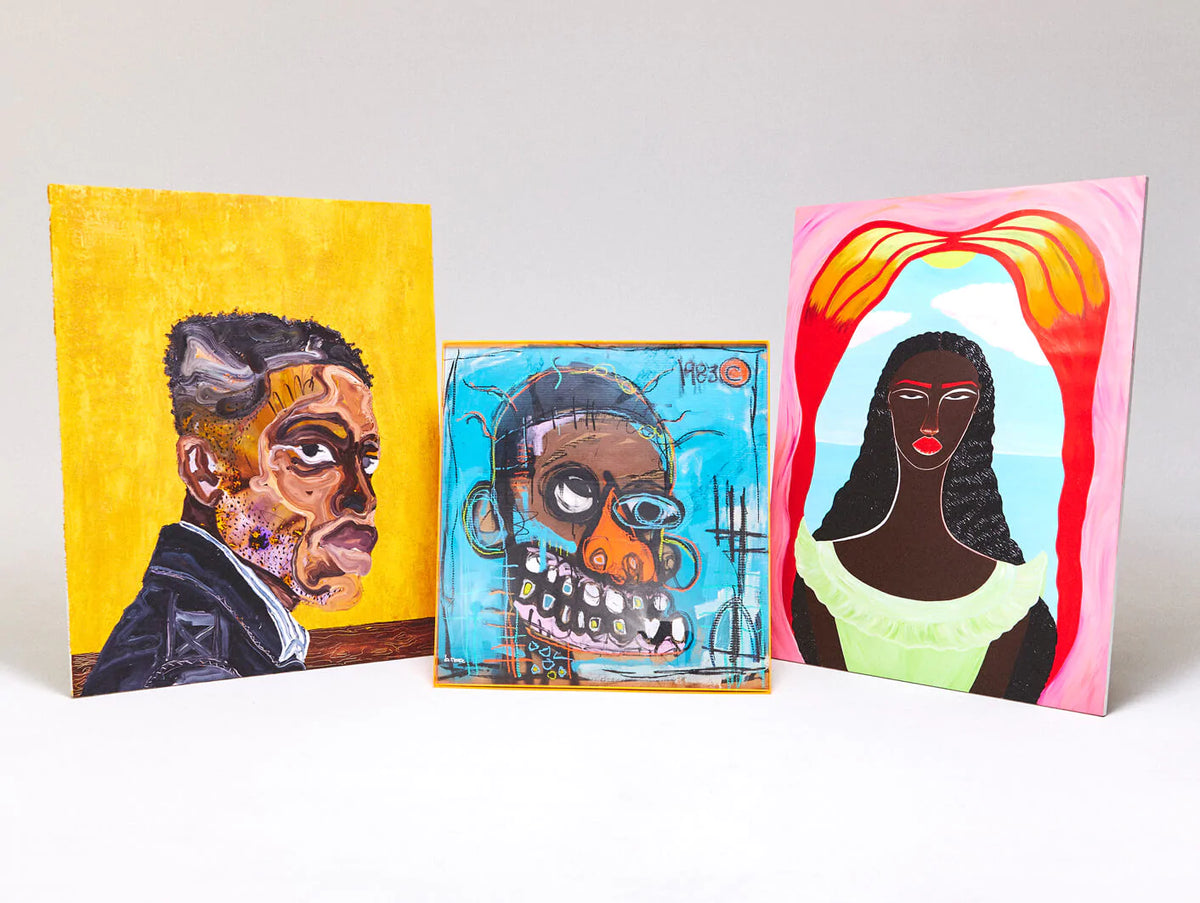
To honor Black History Month, Kith has partnered with three independent creators — b. Robert Moore, Delphine Desane & Ludovic Nkoth — on a capsule of apparel featuring each one’s work. As part of this project, Kith’s Senior Project Manager, Marlon Beck II, had a conversation with the artists to share their perspectives, journeys, and to discuss the significance of responsibility as a Black creative.
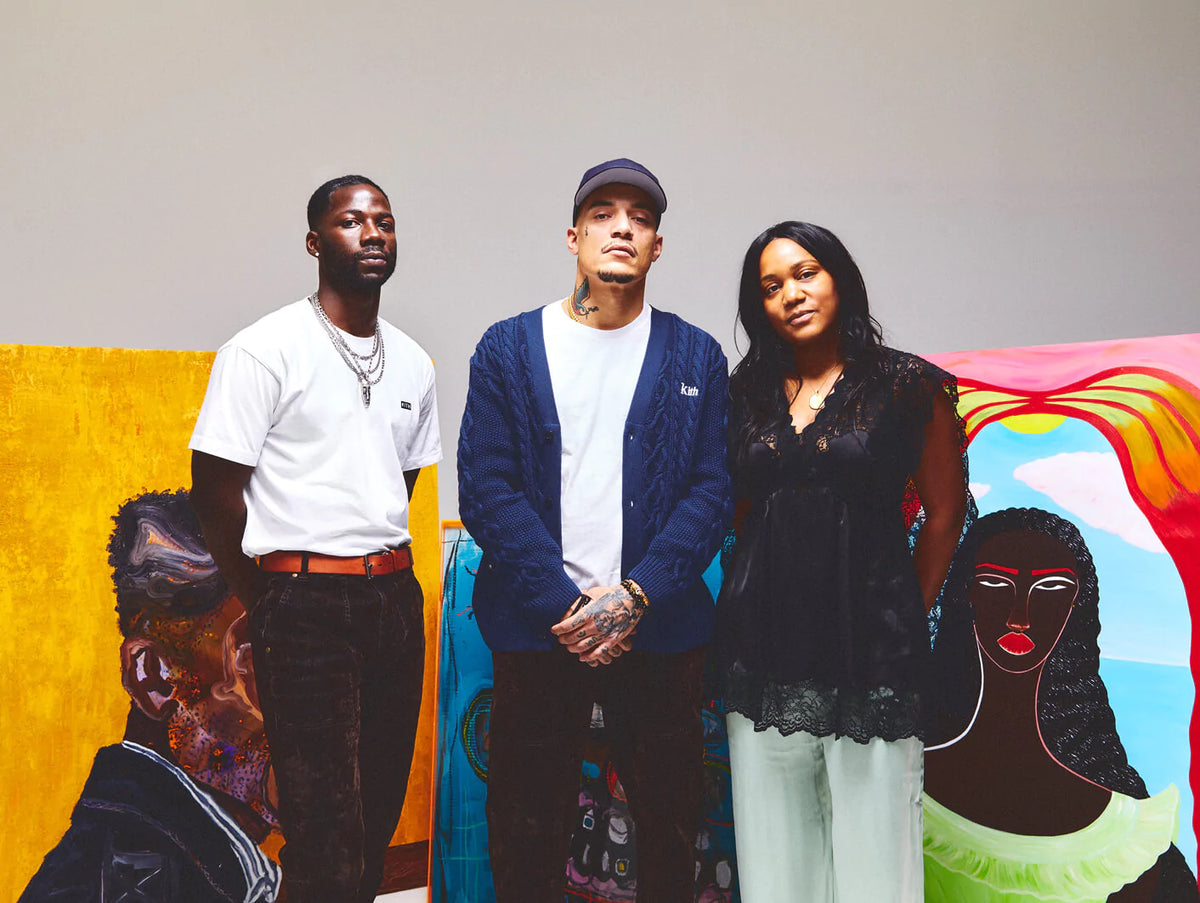
Marlon Beck: Each of you have such a unique journey to becoming an artist. Could you share a bit about your paths?
Ludovic Nkoth: I’ve always just done art, from the beginning. It started back in Cameroon, South Africa walking around with a chalkboard or pen, trying to capture what was in front of me. I wouldn't even say I understood what I was doing because we never had a culture versed around art there, so I was just trying to replicate my spaces. The people around me, like my parents, didn’t understand it either. It wasn't until I moved to the states that I realized you can make a living out of this. I went to high school in rural South Carolina where I was introduced to some teachers who saw me painting. I couldn’t speak English properly until about 8th grade, so they advised me to take an art class.
In high school, I was introduced to paint and since then I never put the paintbrush down. In my first year of undergrad, I got my own studio that a part-time job paid for. Every day after work or soccer, I’d run down to the studio and paint until 3AM. My parents and I disagreed a lot back then, but my vision and dreams had to happen once I made it to New York.
Delphine Desane: I have always been creative, but I didn't think about becoming a painter until I became a mother. Prior to that I worked in the fashion industry for about ten years. After I had my son, I realized that I seriously wanted to change career and stay away from the fashion industry. I was over it and wanted to start something new. I started to paint during my maternity leave, it was a way for me to cope with postpartum depression. I was working in the dark and felt no pressure doing it. A few months later I was commissioned by Vogue Italia to Illustrate their Vogue January 2020 cover and that's when I gained serious exposure about my work. It took me a while to accept that this was something that I was going to take on as a career. I was not prepared. My work has since been exhibited in both Solo and Group shows across the US, Europe and the UK. I had my first solo show at Luce Gallery in 2021, was recently part of a museum group at MOMU museum in Antwerp, Belgium.
b. Robert Moore: I grew up in Iowa which is predominantly white and not really diverse. I had a Black single father who was a Chinese martial arts teacher which is pretty rare. As a kid I doodled and sketched, but was more fascinated with art holistically, whether dance, poetry, or even my dad’s martial arts. As I got older, I went from the military to selling drugs to a corporate job. In 2012, I got into some trouble, and I was looking at 5 to 25 years in jail which really shook me. I then decided to get a “real” job in hopes of becoming a grown man, but it ended up making me very unhappy. I started drinking much more than usual and using drugs before I began to feel burnt out 4-5 years later. I was just trying to find happiness through material things, or some sort of purpose and I think I had it backwards. I think you should lead with purpose and the money and materials come after it.
As a birthday present, I received a DNA test and it connected me to my roots much deeper. Being Black is beautiful but finding out what parts of Africa and tribes you’re from is such an eye-opening gift. As I got sober around that time, I decided I was going to quit the job, stop cutting my hair and dress the way that felt right. I wanted to let go of all these things I was holding on to and find happiness. I started painting abstract one day and making ten paintings a year. But after that DNA test, I thought the abstract stuff wasn’t really working for me, so I started painting faces. I was painting people that I saw were my people and started focusing on Diaspora and hair and the roots of it. As I was able to compose the artworks, I was able to connect with my culture and people more intimately.
In 2020 I had 600 followers, so I started advertising my work more. About 30% of the proceeds of each painting was going back to advertising. Once I saw it was starting to kick off, I kept creating. I then began to connect with other independent artists and collectors that believed in my art, and it felt like a community. I was doing something I love and as a Black man to not be rich, but still feel the freedom success can afford us is the greatest form of currency to me.
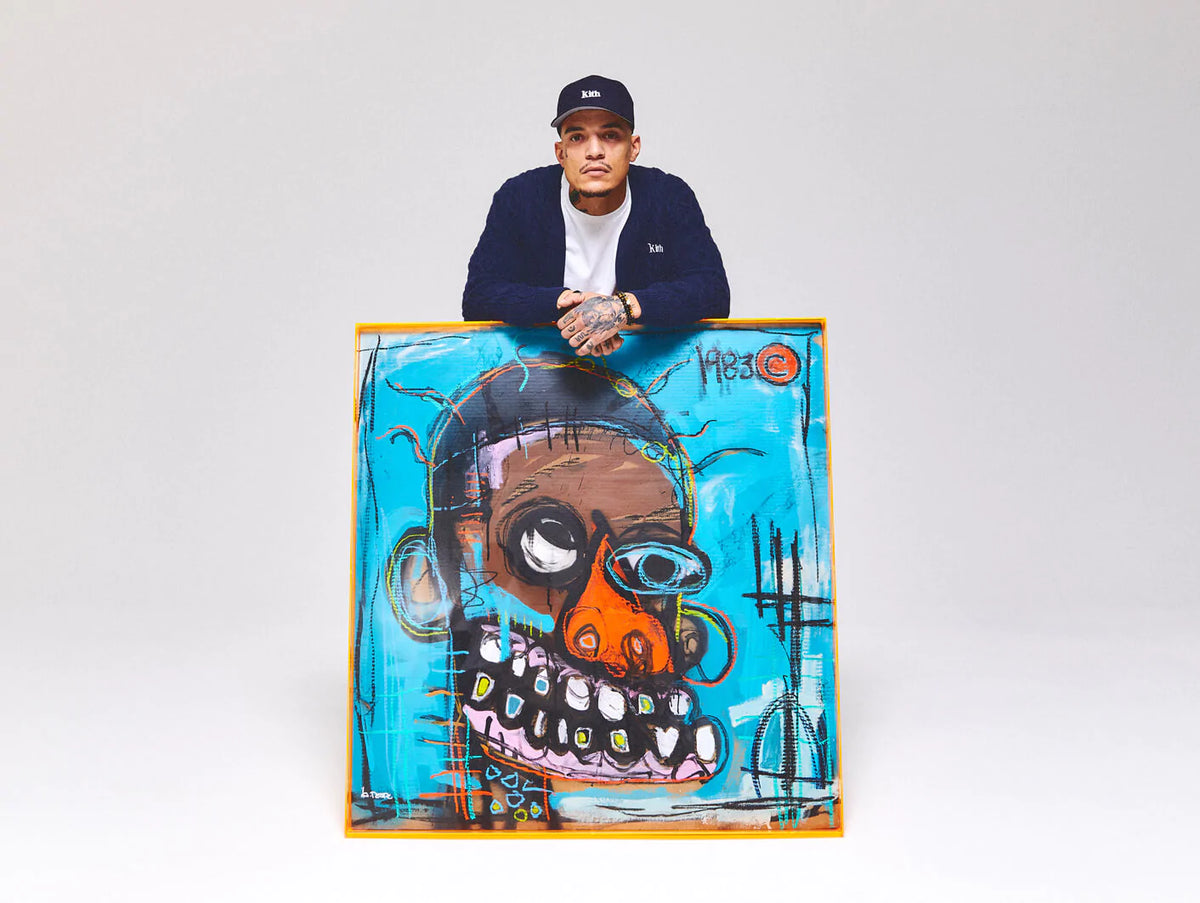
I was doing something I love and as a Black man to not be rich, but still feel the freedom success can afford us is the greatest form of currency to me. - b. Robert Moore
MB: Robert, you recently debuted your collection “Brown Like Me” where you reimagined a few of your favorite TV shows growing up including The Peanuts, Jetsons, Flintstones and more. What inspired this series?
RM: There's a natural connection back to Africa consisting of textiles, dance and painting - it's all art so we all have these tribal characteristics ingrained in us. I have four different styles because I’m self-taught and resistant to the whole traditional profile of an artist that only paints one style. I started researching for Black or Brown artists that reimagined these iconic cartoons, but since I couldn’t find it I just did it myself. I did Lucy with a blue dress, cornrows, and the Charlie Brown stripes because it broke down some of the gender stereotypes. I eventually posted it online and the response from people was crazy. I usually think those are my least favorite pieces because of the lack of technical application but the emotional response from people is probably the highest because all races can connect to it.
MB: Ludovic, many of your works are inspired by family memories and traditions you grew up with that have also helped shape who you are today. Tell me a bit more about this.
LN: I like to focus on family because growing up, I moved around a lot, so I never felt like I was grounded. I grew up with my grandparents before living with my mom, and then with my dad which is why it touches me. My roots are so powerful and when I moved to the United States, I blended in a little bit but then people would say “You’re African… what are you doing here?” Then when I’d go back home, the people in Cameroon would say that I am American. It took me back to the thought of not having an identity, but my artwork is a reminder that I am who I am. I try to cultivate this in a conceptual way in my work because they are my why.
MB: Delphine, you started painting only a few years ago and the sky has become the limit for you. With this being relatively new, what themes and practices are you trying to implement in your work the most?
DD: I’m currently working on two different bodies of work at the same time. I’ve recently started to work on textiles alongside my work on canvas and linen. Through my textile work I am questioning my French and Caribbean origins from a post-colonial perspective. I also have my ceramic practice which allows me to slow down and think differently in a three dimensional way.
MB: Robert & Ludovic, what message do you want viewers to take away from your artwork?
RM: I try to provoke emotion in my work. I have a written component with all my pieces. I realize there's learning styles in the human mind in terms of the way we process information - so I do that because I know half the people won’t read s***. It's also because I'm really fascinated with the person that's able to understand that written narrative without reading it. Those are usually the hardest to buy because I don't make them available. It's my journal. Growing up, I used to love these cartoons until I realized it was missing people that look like us. The earlier you can understand that representation isn't there and call that out, the greater the opportunities are.
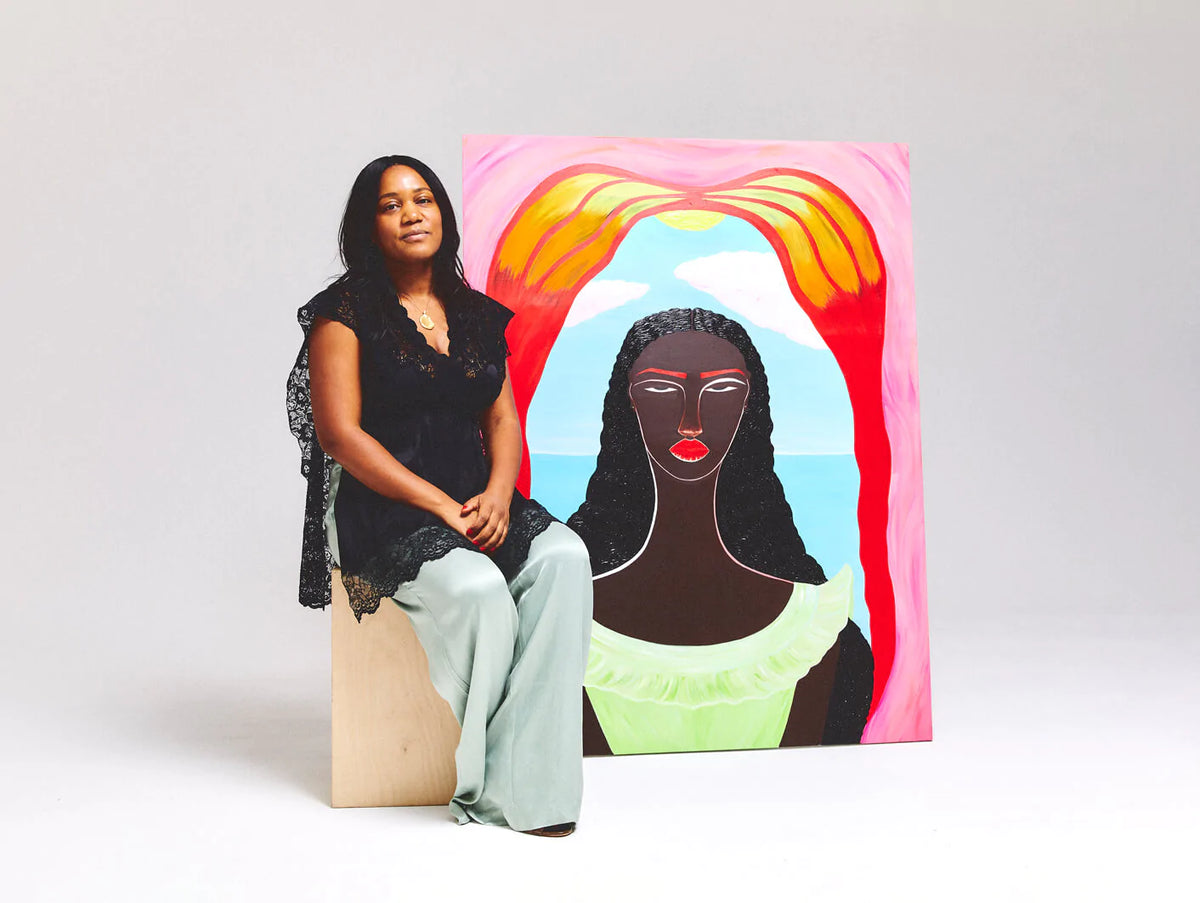
The idea of belonging here and having my work be accessible to the culture is very important to me. - Delphine Desane
LM: I contradict myself a lot because once a piece leaves my studio, I have no say anymore. When you see a painting by me at a gallery, I can't control what happens between you and the piece. I make sure the work highlights a specific conversation but not too specific where you must dive deep into it. I love walking into shows where I don't know what’s going on. I start realizing that what's going on in front of me is what’s going on inside of me. I just hope whenever someone stands in front of my art, they feel seen as well as have a sense of wanting to speak on something. Representation is important because growing up, I didn’t see a lot of people doing what I do now. If you don't see people that look like you doing things you aspire to do, you’re never going to try because you're not trained to think that it’s possible.
MB: I couldn’t agree more and that is why it’s so important to have representation. Were there any major challenges that you experienced along the way?
RM: The art world has been defined by access. which is actually very hard. There's a political system of how art is acquired, how relationships are curated and these gatekeepers that control the art world. It is not owned by people that typically look like us or advocate for us. Representation trickles down because if we don't have people that own these spaces that look like us to give us access, we get discouraged because we don't see that representation in the boardroom. The more Black artists, the more younger versions of us can see that it's possible. I’m glad I had the humility to go through the path that I did. I created a platform to give others the same access and as an independent artist, I want us to be at the top of that ladder but also believe that if we lead the plantation, we don't necessarily need to go through the next one.
RM (cont.): We have a little part of the land that's our own.
LN: And that’s a fact.
MB: As we embark on a new year, what are you looking forward to most after this project?
LN: I can't fully speak on it, but I have a project that I was able to do while I was back home for a whole month. I was able to do amazing research on the ground with the people. I'm excited to filter everything through my lens and I'll be showing that this year. I’m also excited to slow down because it's been a crazy two years and I want to start moving at my own pace.
DD: I have a couple of projects coming in 2022 and 2023. I can't talk about many of them, but one of them is a museum show in 2023.
RM: I have a collectible toy dropping a week after this project. I'm excited for that. I also have my first solo show independently which is going to be in the Midwest. More info coming soon.
LN: I’m just going to send you my address for that, ha.
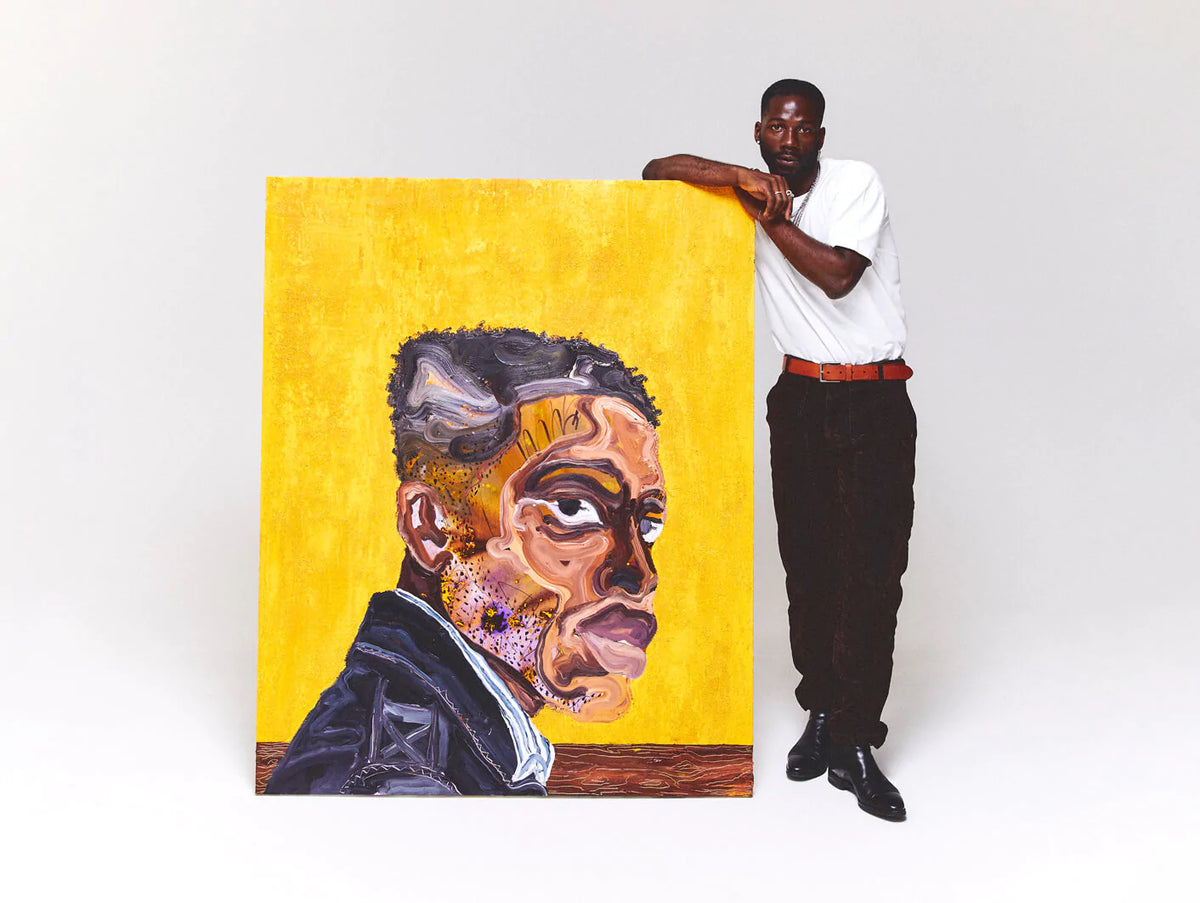
If you don't see people that look like you doing things you aspire to do, you’re never going to try because you're not trained to think that it’s possible. - Ludovic Nkoth
MB: It has been an absolute pleasure to partner with the three of you on this project because this is an initiative geared toward providing our platform to others. Can you talk about why you wanted to be a part of this moment with Kith?
LN: The history of this country hasn't always favored us and it’s exciting to be a part of a dialogue that had the best interest in me. I love when we can reclaim things, change it our way and be able to retail Black history, the way we are doing right now. I haven't always felt like I belong in this country, however the Black community always showed love. To be able to give back to that New York community is amazing. I owe everything to this city and the people that helped me maneuver throughout here. Being able to elevate this moment through art is beautiful. We always cherish Black art, but we don’t cherish Black history. With this project, we’re able to speak on both aspects so I knew I had to be included.
DD: I'm an immigrant so it's tough to feel like you belong here. I always feel like an outsider because of my origin being French from Haitian descent. The idea of belonging here and having my work be accessible to the culture is very important to me.
RM: The amplifications of our work and your brand. The brand is really you guys. Being able to see the intentions and how each team is composed here is what I am most proud of. If we took a snapshot of every person, from 1% to 100% that was involved in this project and what that would look like, that would make me really f****** happy. Anyone can make a shirt, but to me it's about the creatives and the person who is leading the ideas that are behind it and that was you from start to finish with me. That's why I'm proud of it.
MB: This really means a lot to me, and this project is about more than product. It’s about intention. Thank you all.
